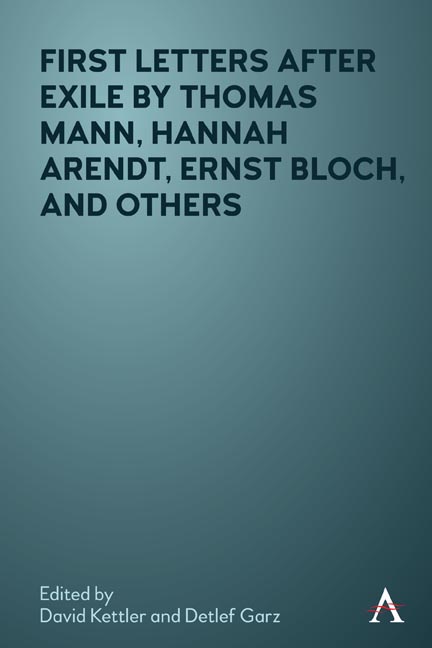Book contents
- Frontmatter
- Contents
- Preface
- Chapter 1 The “First Letters” Exile Project: Introduction
- Chapter 2 “That I Will Return, My Friend, You Do Not Believe Yourself ”: Karl Wolfskehl – Exul Poeta
- Chapter 3 “I Do Not Lift a Stone”: Thomas Mann’s “First Letter” to Walter von Molo
- Chapter 4 Faust Narrative and Impossibility Thesis: Thomas Mann’s Answer to Walter von Molo
- Chapter 5 “That I Am Not Allowed for a Moment to Forget the Ocean of Blood”: Hans-Georg Gadamer and Leo Strauss in Their First Letters after 1946
- Chapter 6 Return into Exile: First Letters to and from Ernst Bloch
- Chapter 7 A Postwar Encounter without Pathos: Otto Kirchheimer’s Critical Response to the New Germany
- Chapter 8 An Exile’s Letter to Old Comrades in Cologne: Wilhelm Sollmann’s Critique of German Social Democracy and Conception of a New Party in Postwar Germany
- Chapter 9 First Letters: Arendt to Heidegger
- Chapter 10 Denazification and Postwar German Philosophy: The Marcuse/Heidegger Correspondence
- Chapter 11 “It Would Be Perhaps a New Exile and Perhaps the Most Painful”: The Theme of Return in Oskar Maria Graf ’s Letters to Hugo Hartung
- Chapter 12 Social Constellation of the Exile at the End of the Second World War and the Pragmatics of the “First Letters”: An Objective Hermeneutic Structural and Sequence Analysis
- Notes on Contributors
- Index
Chapter 5 - “That I Am Not Allowed for a Moment to Forget the Ocean of Blood”: Hans-Georg Gadamer and Leo Strauss in Their First Letters after 1946
Published online by Cambridge University Press: 25 February 2022
- Frontmatter
- Contents
- Preface
- Chapter 1 The “First Letters” Exile Project: Introduction
- Chapter 2 “That I Will Return, My Friend, You Do Not Believe Yourself ”: Karl Wolfskehl – Exul Poeta
- Chapter 3 “I Do Not Lift a Stone”: Thomas Mann’s “First Letter” to Walter von Molo
- Chapter 4 Faust Narrative and Impossibility Thesis: Thomas Mann’s Answer to Walter von Molo
- Chapter 5 “That I Am Not Allowed for a Moment to Forget the Ocean of Blood”: Hans-Georg Gadamer and Leo Strauss in Their First Letters after 1946
- Chapter 6 Return into Exile: First Letters to and from Ernst Bloch
- Chapter 7 A Postwar Encounter without Pathos: Otto Kirchheimer’s Critical Response to the New Germany
- Chapter 8 An Exile’s Letter to Old Comrades in Cologne: Wilhelm Sollmann’s Critique of German Social Democracy and Conception of a New Party in Postwar Germany
- Chapter 9 First Letters: Arendt to Heidegger
- Chapter 10 Denazification and Postwar German Philosophy: The Marcuse/Heidegger Correspondence
- Chapter 11 “It Would Be Perhaps a New Exile and Perhaps the Most Painful”: The Theme of Return in Oskar Maria Graf ’s Letters to Hugo Hartung
- Chapter 12 Social Constellation of the Exile at the End of the Second World War and the Pragmatics of the “First Letters”: An Objective Hermeneutic Structural and Sequence Analysis
- Notes on Contributors
- Index
Summary
Introduction
The first letter after a long interval is always an approach tied to uncertainty. One presents oneself to someone who may have only a dim memory or have turned away, or indeed be eagerly waiting. Once the letter arrives, the preconceptions are reduced to speculations, since the letter now challenges the recipient, while the sender has revealed his intentions. Now the real work on the letter begins. The first reaction is not free anymore—however it is answered. The dependence on the first letter is manifest even in its most complete rejection. Every tennis player is familiar with the situation after the serve. Naturally, the ball—to stay with the metaphor—can be returned so as to produce an immediate winning point; the whole game can even be won in this manner. But this quality cannot be forced. It is, and remains, dependent on what was offered as the point of departure. First letters provide the original framework, but they can nevertheless not be understood without the rejoinder. Only the exchange makes it possible to offer an interpretation. A single letter, by comparison, remains self-referential and has, at most, documentary value. Naturally, there is also a type of letter that neither wants nor demands an answer. If there is nevertheless an answer, this too is altogether bound to the first letter. This sort of correspondence attracts no interest because it merely documents a second ending. A second one, since the actual first one was a factual one that one has temporarily ignored, often without knowing more precisely why.
What has been said applies especially to the letters that were written from Germany after 1945 to the exiles. In the cases made public until now, the attempt to develop a conversation appears most prominent—a conversation often with very clearly circumscribed assignment of roles that nevertheless allow for no conclusion about the manner in which the motivational designs behind them are exactly distributed. The hope for absolution on the German side—as the correspondence with Martin Buber shows most clearly—often mixes with pride at having led their own, distinctive lives.
- Type
- Chapter
- Information
- Publisher: Anthem PressPrint publication year: 2021



